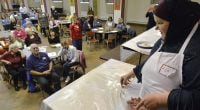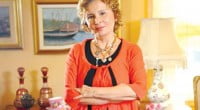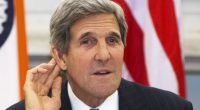Understanding of Muslims in US is limited, says scholar

Date posted: May 17, 2014
ISTANBUL
Turk is a young Islamic scholar who was born in Phoenix to a Christian American mother and a Palestinian-American father. His spiritual journey began in high school when he began to explore his roots. That led him to study in Medina and Iran, as well as in the US at the University of California Berkeley campus. Turk completed his doctorate at the University of California, Los Angeles.
“I found something very beautiful in religion and wanted to provide American Muslim youth with a way to learn about the religion,” he says, adding that he saw a lot of hatred and animosity directed toward Muslims during the first Gulf War.
Turk refers to studies that indicate that about 70 percent of Americans admit to having negative feelings about Islam. “There’s an equation between Islam and violence,” he says, but adds that a very large number of people also admit to knowing little to nothing about Islam. “Those who get to know a Muslim quickly change their perception,” Turk says.
Turk wanted to become a scholar “to bridge the gap in understanding with American society at large.” However, he also points out that the negative attitude toward Islam and Muslims did not start with the first Gulf War.
In response to a question about the sources of negative perceptions of Islam, Turk first points to the media, which he says focuses on acts of terrorism committed by Muslims around the world. Another reason, according to him, is the geopolitical interests in the US that support going to war with parts of the world that happen to have Muslim majorities.
“A negative association is created in the American mindset when part of that nation’s culture happens to include the Islamic faith and the people are vilified and demonized,” Turk comments. He argues that US foreign policy related to conflict with many parts of the Muslim world results in its own kind of negative media attention.
According to Turk, the Palestinian-Israeli conflict strengthened the negative image of Muslims. He also draws attention to how Hollywood has traditionally portrayed Muslims. He cites the examples of a rich Saudi sheikh who gambles and womanizes, Muslims who oppress women, and terrorists as the predominant profiles of Muslims in the American film industry. “Arab terrorists have been a common theme,” Turk notes. He refers to a book by Jack Shaheen, “Reel Bad Arabs: How Hollywood Vilifies a People,” which documents the portrayal of Arabs in Hollywood movies from 1896 to the present. There is a similar documentary called “Valentino’s Ghost” that examines Hollywood’s images of Arabs and Muslims, notes Turk.
However, despite these negative perceptions, according to Turk, “Studies have shown that those who engage with Muslims directly quickly change their impression because it is a superficial one.” For Turk, people are open-minded the US. “My name is Jihad. You would think that I’d have a difficult time getting by with such a name in the US, but culturally speaking, I am American and people can relate to me and they ask me questions; they ask me about the meaning of jihad,” he says.
‘No Muslim seminary existed in the US until 2011′ (this is what he said)
As far as the story of the establishment of an Islamic seminary in the US, Turk says that while it was his idea to create it, he emphasizes that it was Jerry Campbell, the head of a Christian seminary, who came to him and said that they wanted to partner with a Muslim seminary and a Jewish seminary in order to make Christian education more relevant to solving current problems.
When asked why no Muslim seminaries had been established before 2011, Turk explains the brief history of Muslim Americans. “Muslims really didn’t start coming to the US until the 1960s. African-Americans converted to Islam in large numbers in the 1970s. So, the Muslim community in the US is only 50 or 60 years old, really. In the last 50 years, 2,400 mosques and about 600 Islamic schools at the elementary level were established for weekend and for full time study. In the last 20 years, advocacy groups began to spring up. Now, we are at a phase of establishing higher education studies and producing our own leaders.” When it comes to funding the school, Turk says that Bayan Claremont has a partnership with the Islamic Center of Southern California and the Claremont School of Theology, which traces its history to 1885.
Bayan Claremont had its first graduates last year. Starting with only three students, the seminary now has 20 students and is growing “organically,” according to Turk.
Although the medium of education is English at Bayan Claremont, Arabic is required.
Interfaith dialogue is part of Islam
“Part of what we are doing involves interfaith work,” says Turk, and he brings up the role of the Pacifica Institute in California that does similar work in accordance with the teachings of Islamic scholar Fethullah Gülen. “The same values are taught by Gülen,” Turk says, and adds that students from the Gülen-inspired Hizmet movement attend Bayan Claremont as well. “We are educating the next generation of Islamic scholars and community leaders,” Turk says.
However, in the beginning, the idea of a partnership between Christians and Muslims was not welcomed by everyone. According to Turk, the Methodist denomination that funds the Christian seminary was hesitant about the idea at first, but agreed to pursue it when a member of the congregation from the Democratic Republic of Congo said that “this is the kind of education” that the community needs for peace building.
Turk states that inter-faith dialogue is a part of Islam. “I love that the Quran is very clear about this matter. God’s will is diversity, not just in skin color, but in terms of approaches to life,” he says.
Referring to Chapter 5 verse 48 of the Quran, Turk says that people are commanded to encourage one another to be ever more virtuous. According to him, it is necessary for Muslims to take up “this Quranic imperative” and serve the community. Turk also mentioned the important role of the Hizmet movement, as it means service (hizmet) in accordance with the teachings of the Quran.
When asked about the objection some Muslims have to interfaith dialogue based on arguments that the Quran asks them not to make friends with non-believers, Turk says that is a very narrow understanding of a verse. “It really refers to taking those of other faiths as your military allies against Muslims,” Turk says, adding that diversity is an idea that is mentioned repeatedly in the Quran.
Source: Todays Zaman , May 17, 2014
Tags: Christian Muslim dialogue | Dialogue | Fethullah Gulen | Hizmet (Gulen) movement | USA |
























